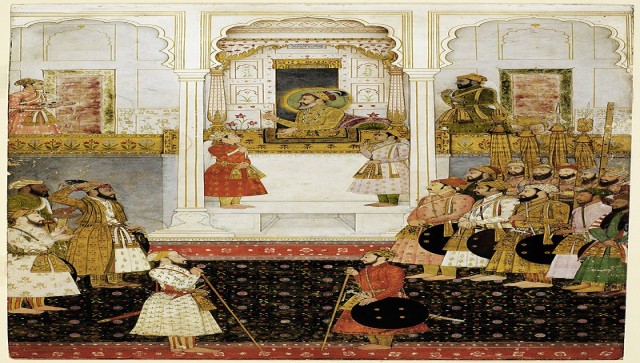If we accept the far-left fiction masquerading as history that the Mughals were the rulers of the whole of Hindustan, we come to the logical conclusion that they made a rotten job of protecting its independence. If anything, the Mughals almost single handedly opened the doors for the eventual takeover of India by a struggling British trading corporation. Copious historical sources including Muslim and European records clearly reveal an underlying truth of the core character of the Mughal regime: at no point were its kings interested in securing and protecting the independence and integrity of India. Like every medieval Islamic empire, the Mughal variant too, was a religious-imperial despotism. Its sultans were self-obsessed and the Islamic clergy was only too happy to feed their narcissism. The Mughal sultan was not merely a king but the protector and agent of Islam’s expansion in infidel lands. The intrinsic nature of this world-conquering tenet made oppression of non-Muslims mandatory. The Sharia law was ostensibly divine, but its application was entirely in the hands of a special breed of Muslims—the sultan and the Qazis. How this application translated into the real lives of the people has been described by medieval Muslim chroniclers themselves, who candidly gloat about the sort of degradations the sultan heaped over the Hindus. Thus, the interpretation of these divine laws was whimsical, arbitrary and unscrupulous. Depending on one’s luck or clout, approaching the sultan as the last refuge of justice often proved fatal or beneficial. The absolute despotism of the Mughal sultans created a state of fear in both senses: the state as a political entity and state as a condition. Respect for the sultan was thus enforced through fear and brutality and both, and was not inspired by character and conduct, a far cry from Hindu kings who feared the people on that singular count: of being regarded as a ruler who disobeyed or violated Dharma. Therefore, enforcing fear necessitated the maintenance of a large, standing military force in peacetime. Francois Bernier who visited India during the 17th century made an unflattering but truthful observation of this condition: “The Great Mogol is a foreigner in Hindoustan. To maintain himself in such a country he is under the necessity of keeping up numerous armies, even in the time of peace.” On the contrary, this feature was absent at any time in the long history of Bharatavarsha under Hindu rulers. As the legendary Devanahalli Venkataramanaiah Gundappa (DVG) correctly notes, “whenever there was Hindu rule, there was no tyranny.” This stranglehold of political power concentrated in the hands of an autarch also manifested itself in various ways, all of which choked India’s all-round progress and set us back by several centuries. First, the accumulated learning and knowledge of the eons were not only destroyed but screeched to a near-permanent halt. We can look at another contrast, for example: if the Sevuna Empire of Devagiri could produce at least six generations of top-notch astronomers, mathematicians, musicians and poets in less than two centuries amidst cyclical warfare, what explains the fact that not a single university or institution of excellence was produced throughout the entire duration of the “glorious” Mughal rule? Second, the theo-totalitarian nature of the Muslim or Mughal sultan inaugurated a climate of servility, which fundamentally debased the human character by smoking out self-respect. Officials of all ranks, down to the man on the street could hope for security and economic progress only by emulating and flattering the sultan. W.H. Moreland provides an awful sample of how this crass system worked in the regime of Akbar “the great.” The amount of labour expended in the performance of personal services is… one of the outstanding economic facts of the age of Akbar. Some of the men thus employed were free, while others were slaves, but the functions assigned to both classes were…interchangeable… In order to realise fully the extent to which productive forces were diverted to serve the purposes of luxury and display it is necessary to acquire a thorough familiarity with the conditions of life in India at this period… the Emperor set the standard in such matters, and that every one who occupied or aspired to a position at Court followed that example so far as his means allowed. the Imperial Household [and its] zanana, which contained more than 5000 ladies, each of whom had separate apartments; they were attended by an adequate staff of servants, and watched in successive circles by female guards, eunuchs, Rajputs, and the porters at the gates, apart from the troops stationed on all four sides of the buildings…Supplies for the Household were obtained from distant sources, apparently regardless of the amount of labour expended. Wherever the Emperor might be, water for his use was brought from the Ganges, while ice came daily by post carriages and by runners from the snowy mountains to Lahore, and fruit was supplied regularly from Kashmir and Kabul, and even from more distant sources, such as Badakhshan and Samarqand. The full details are truly sickening and the picture becomes worse when we survey the despotisms of Jahangir, Shah Jahan and Aurangzeb. It is actually a wonder how Hindus as inheritors of a spiritual civilisation actually emerged from this Mughal nightmare with their sanity largely intact. What refinement, what culture, what scholarship, what learning can grow in such an environment? To be continued
The author is the Founder and Chief Editor at The Dharma Dispatch. Views are personal.
Read all the Latest News , Trending News , Cricket News , Bollywood News , India News and Entertainment News here. Follow us on Facebook, Twitter and Instagram.


)

)
)
)
)
)
)
)
)



